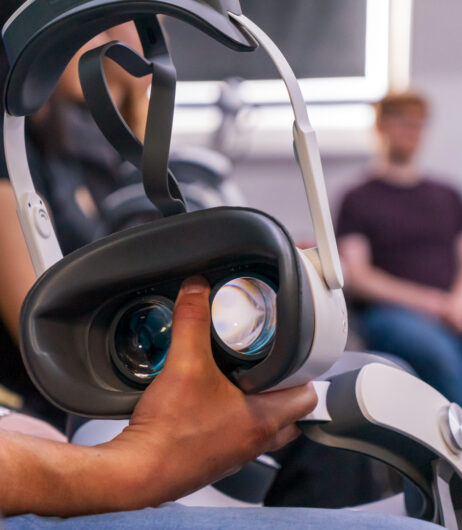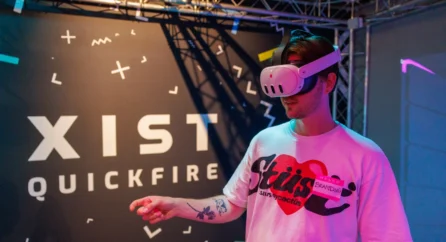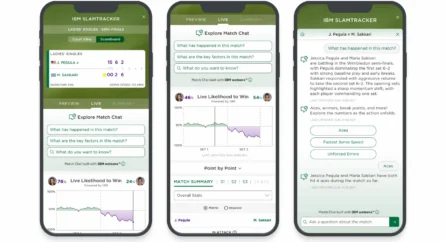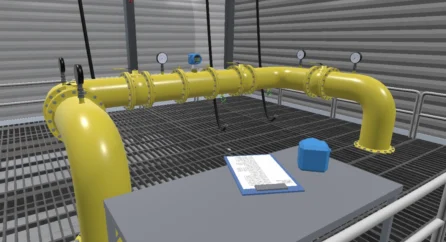Home Knowledge Base What does Meta mean for the immersive tech sector?
What does Meta mean for the immersive tech sector?
5th November 2021

Since the announcement in October 2021 that Facebook is being rebranded as Meta Platforms Inc with a heavy emphasis on VR and AR, there’s been all sorts of speculation about what this means, why it’s happening and what further details will be forthcoming. But if we put aside for one moment the idea that this is a timely distraction from the recent negative news surrounding Facebook itself, then what does this news mean for us in the immersive tech sector? James Burrows, our TD, offers a few thoughts.
There’s new tech coming
If we’re going to move into a metaverse where VR and AR are more mainstream, then it follows that the hardware will need to develop further. So it’s no surprise that the announcement came with a brief overview of some of the new tech on the horizon, namely Project Cambria – a new VR headset – and some ‘Nazaré’ AR glasses. There were tantalisingly few details, but we did find out that the new VR headset will be able to simulate natural eye contact and facial expressions of its users in real-time, which we’re looking forward to seeing (not least to find out how). There’s also progress to full colour passthrough and the use of pancake optics to create slimmer, more comfortable, VR lenses – which is good news for encouraging more people to use the technology. Meanwhile pretty much all we learned about the AR glasses is that they’ll be 5mm thick. So it remains to be seen just how much Facebook (sorry, Meta) will be pushing the hardware capabilities to drive the metaverse into a more concrete concept. Project Cambria is being pitched as a high-end professional headset rather than the next iteration of the Quest, but it’s almost certain that these improvements and innovations will trickle down to cheaper consumer devices over time.
A mass mixing of technological platforms
It won’t all be about VR and AR hardware, however. One thing we can take from the proposed metaverse is that it looks to create a cohesive immersive experience across a range of technological platforms. The exact words Zuckerburg used were: “We believe the metaverse will be the successor to the mobile internet, we’ll be able to feel present – like we’re right there with people no matter how far apart we actually are,” while VP of Global Affairs Nick Clegg described it as a series of interlinked worlds, where a user moves seamlessly from Facebook’s world to Apple’s or Google’s, or a computer game’s. To actually achieve this, it’s reasonable to expect that Facebook will need to make it easier to integrate its VR/AR capabilities with other metaverse systems created by other companies, such as Microsoft for example, and to make their offering scalable and easily accessible. In the course of our work developing both VR and AR experiences for a range of organisations, we’ve often faced the challenge of clashing APIs, toolkits and standards – so could we be seeing more technological cooperation on the horizon?
More investment, more demand
There’s no denying Meta has a hefty head start in the race to create a virtual future with Facebook, Whatsapp, Instagram and Oculus under its banner – all offering up invaluable data on how people behave and interact online. It also offers phenomenal reach, with 2.9 billion users straight out of the gate. But to make the metaverse possible, there’s going to have to be a lot more money poured into R&D – which we can see happening already. Facebook’s Reality Labs is busy uniting developers, researchers, engineers and designers in the quest to create the feeling of ‘presence’ when using different immersive applications, and they’re also investing in software to enable things like ‘teleporting’ into another space as if you’re there using technologies like volumetric capture. This in turn will lead to more demand for certain skills, so 3D artists and those with a gaming background, such as design or development, may soon be in high demand for asset creation – while content providers may become more sought after as more people adopt the metaverse Zuckerburg is driving us towards. Inevitably, the metaverse announcement is one that will divide opinion, not least because of the issues that have come to light in recent months surrounding Facebook’s activities. But looking at it from a purely immersive standpoint, it will be interesting to see what comes next – and whether this is the tipping point where VR and AR indeed become the next normal.

James Burrows
Chief Executive Officer
Related posts

















